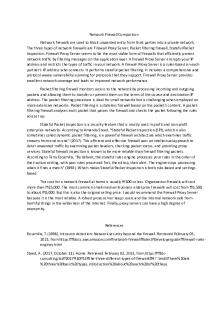Network Firewall Comparison PDF

| Title | Network Firewall Comparison |
|---|---|
| Course | Introduction To Firewalls |
| Institution | Community College of Baltimore County |
| Pages | 1 |
| File Size | 35.9 KB |
| File Type | |
| Total Downloads | 10 |
| Total Views | 139 |
Summary
About Comparison of network firewall...
Description
Network Firewall Comparison Network firewalls are used to block unwanted entry from third parties into a private network. The three types of network firewalls are Firewall Proxy Server, Packet filtering firewall, Stateful Packet Inspection. Firewall Proxy Server seems to be the most stable form of firewalls that efficiently protect network traffic by filtering messages on the application layer. A firewall Proxy Server encrypts your IP address and restricts the types of traffic in your network. A firewall Proxy Server is a rules-based on each partner's IP address who connects. It performs stateful packet filtering. It includes a comprehensive and protocol-aware vulnerability scanning for protocols that they support. Firewall Proxy Server provides excellent network coverage and leads to improved network performance. Packet filtering firewall monitors access to the network by processing incoming and outgoing packets and allowing them to transfer or prevent them on the terms of the source and destination IP address. The packet filtering procedure is ideal for small networks but is challenging when employed on more extensive networks. Packet filtering is a stateless firewall based on the packet's content. A packetfiltering firewall analyses each packet that passes the firewall and checks the packet following the rules you set up. Stateful Packet Inspection is a security feature that is mostly used in profit and non-profit enterprise networks. According to Amanda Steed, "Stateful Packet Inspection (SPI), which is also sometimes called dynamic packet filtering, is a powerful firewall architecture which examines traffic streams from end to end" (2017). This efficient and effective firewall uses an intellectual approach to deter unwanted traffic by examining packet headers, checking packet status, and providing proxy services. Stateful firewall inspection is known to be more reliable than firewall filtering packets. According to Terry Escamilla, "By default, the stateful rules engine processes your rules in the order of their action setting, with pass rules processed first, then drop, then alert. The engine stops processing when it finds a match" (1998). Which makes Stateful Packet Inspection is both rule-based and settings based. The cost for a network firewall at home is usually $100 or less. Organization firewalls will cost more than $25,000. The most common small-medium business enterprise firewalls will cost from $1,500 to about $5,000. But this is also the original selling price. I would recommend the Firewall Proxy Server because it is the most reliable. A robust proxy server keeps users and the internal network safe from harmful things in the wilderness of the internet. Finally, proxy servers can have a high degree of anonymity.
References Escamilla, T. (1998). Intrusion detection: Network security beyond the firewall. Retrieved February 03, 2021, from https://docs.aws.amazon.com/network-firewall/latest/developerguide/firewall-rulesengines.html Steed, A. (2017, October 11). Home. Retrieved February 02, 2021, from https://btsconsulting.biz/2017/10/11/the-three-different-types-of-firewalls/#:~:text=There%20are %20three%20basic%20types,introduction%20about%20each%20of%20these....
Similar Free PDFs

Network Firewall Comparison
- 1 Pages

Firewall
- 25 Pages

MAKALAH FIREWALL CINDY
- 10 Pages

Tugas presentasi firewall
- 20 Pages

Projet firewall ipcop
- 32 Pages

ITE Case Study - Firewall
- 5 Pages

Ubuntu Uncomplicated Firewall
- 7 Pages

LN11 Firewall - Lecture notes 11
- 43 Pages

Firewall, Proxy, ACL e DMZ
- 2 Pages

Comparison paper
- 6 Pages

Cartoon Network
- 5 Pages
Popular Institutions
- Tinajero National High School - Annex
- Politeknik Caltex Riau
- Yokohama City University
- SGT University
- University of Al-Qadisiyah
- Divine Word College of Vigan
- Techniek College Rotterdam
- Universidade de Santiago
- Universiti Teknologi MARA Cawangan Johor Kampus Pasir Gudang
- Poltekkes Kemenkes Yogyakarta
- Baguio City National High School
- Colegio san marcos
- preparatoria uno
- Centro de Bachillerato Tecnológico Industrial y de Servicios No. 107
- Dalian Maritime University
- Quang Trung Secondary School
- Colegio Tecnológico en Informática
- Corporación Regional de Educación Superior
- Grupo CEDVA
- Dar Al Uloom University
- Centro de Estudios Preuniversitarios de la Universidad Nacional de Ingeniería
- 上智大学
- Aakash International School, Nuna Majara
- San Felipe Neri Catholic School
- Kang Chiao International School - New Taipei City
- Misamis Occidental National High School
- Institución Educativa Escuela Normal Juan Ladrilleros
- Kolehiyo ng Pantukan
- Batanes State College
- Instituto Continental
- Sekolah Menengah Kejuruan Kesehatan Kaltara (Tarakan)
- Colegio de La Inmaculada Concepcion - Cebu




